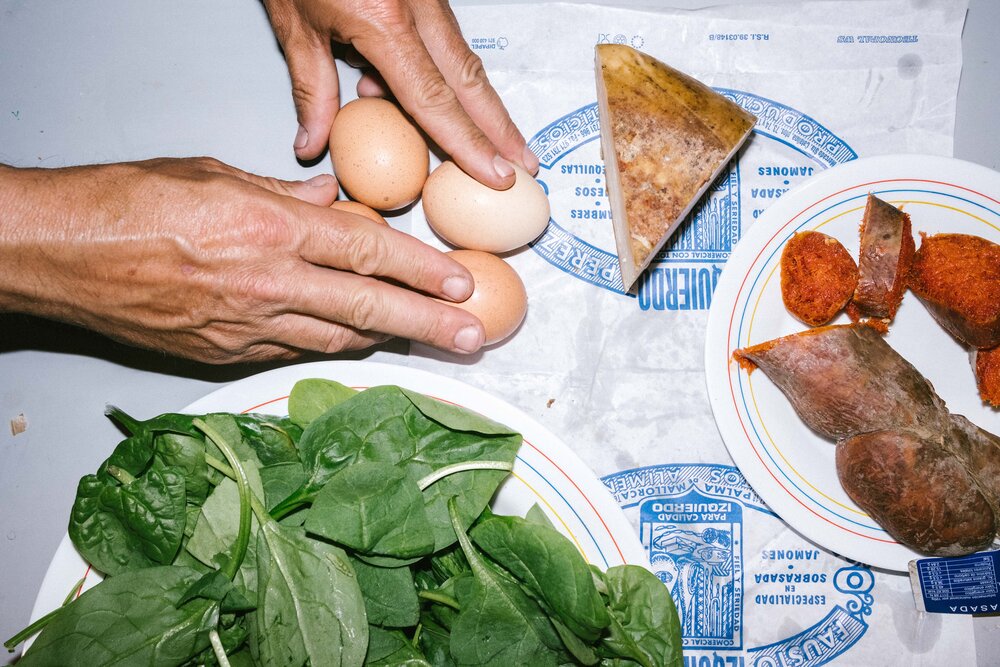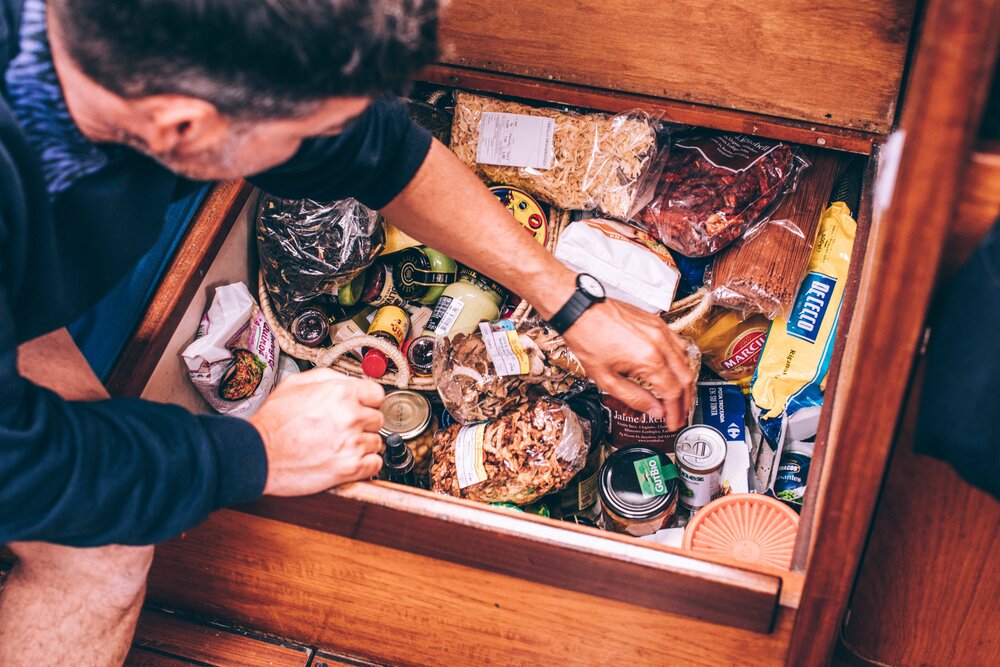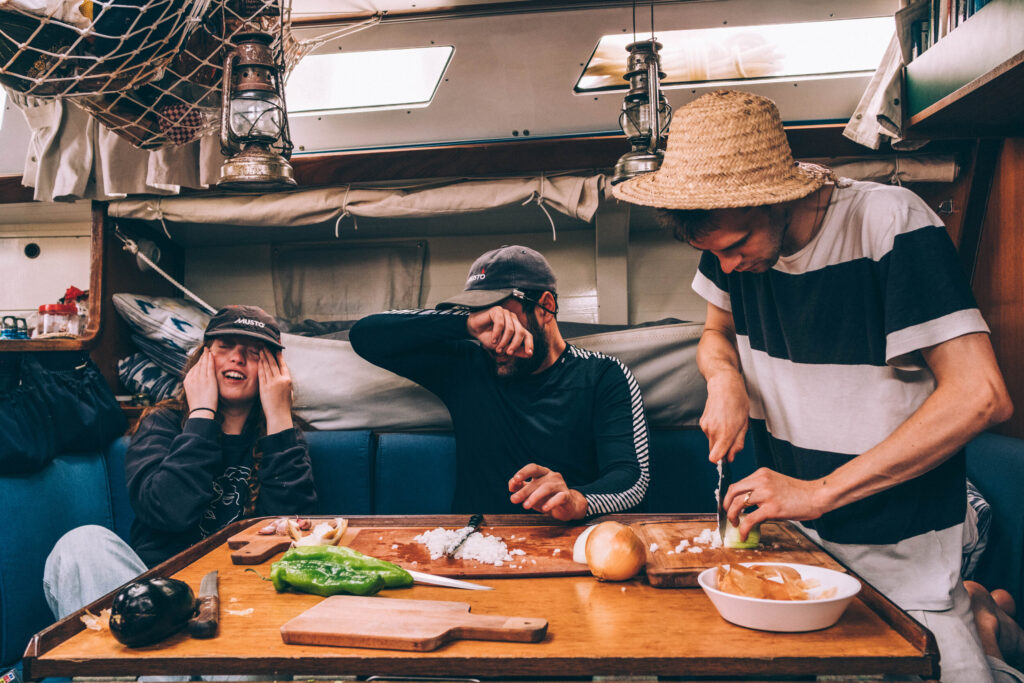“THE NARINAN COOKBOOK. RECIPES FOR A LIFE ON BOARD” BOOK
DESIGNED BY ROBBIE WHITEHEAD · PHOTOGRAPHY BY COKE BARTRINA (SPAIN, 2020)
'NARINAN COOKBOOK. RECIPES FOR A LIFE ON BOARD"
Book
Text and recipes KENNETH PERDIGÓN
Photography COKE BARTRINA
Design ROBBIE WHITEHEAD
Design Assistance NICOLAS BARRETO
Copy editor and translation MADELEINE WILLIS
Foreword VINCENZO ANGILERI
Photography ALBA YRUELA
Artworks MARIA PRATTS, BLANCA MIRÓ SKOUDY
Barcelona, Spain (2020)
“THE NARINAN COOKBOOK. RECIPES FOR A LIFE ON BOARD” BOOK
DESIGNED BY ROBBIE WHITEHEAD · PHOTOGRAPHY BY COKE BARTRINA (SPAIN, 2020)
THE NARINAN COOKBOOK: A PROLOGUE
English (Spanish below)
The sky is dark blue. The sea is calming down. As the night falls on the Narinan, you start hearing the noise of tinkling plates, the involuntary chime of knives and forks, the dingling of piled glasses brought from belowdecks. And, if you listen well, you might be able to hear not only those sounds actually resonating while the crew get the dinner table ready, but you can try to imagine every meal that happened there and every friend, traveler, fellow sailor or apprentice that gathered around the table of Kenneth’s sailboat.
You can picture the silence of the solitary meals and the joy of those loud dinners with friends. The excitement of finally having a bite to eat after a day at sea, with your skin sunburnt on a summer night or protected by sweaters after a long sailing. Or those long sobremesas, with old time friends chatting about life or about nothing at all, all the laughter, the existential shit, the stories and the anecdotes, all the forgotten ideas hurled there surrounded by the safety of a cozy company of friends, with some red wine, a bluetooth speaker, and skins of peeled fruit on the table. You might even picture one of those restoring lunches under the awning deck, finding shelter from the sun, anchored in a bay or in the open sea. Or the breakfasts, prepared on board or fetched from the local pastry shop, and enjoyed while the sea is slowly awakening.
Life seems to have a more human dimension here. And the whole ritual of planning, buying, fishing, inventing, cooking, eating, and sharing food is its celebration.
Cooking on board means leaving the unnecessary on land. What’s on board is what you’ve got. You can’t stock up on fresh food. You can’t rush to the market for something you forgot. The fridge is small. The space is scarce, so are the tools you have. And, of course, the boat is moving. So yeah, you might be finding yourself thinking that you miss a lot of things. Like bigger stoves, wider pans, particular appliances, specific knives, that one unique sauce you have at home, and so on. You can always have more. More space, more time, friends, money, projects, tools, holidays, I mean, fucking whatever. But what if you can’t have it?
More than ever we might have realised that there is no such a thing as a splendid isolation if we are not able to release control and accept the greater workings of life. This is why this cookbook is not just about cooking. And, besides the whole imaginary evoked by sailing — the endless sea, the solitude, the absolute freedom— this book portrays the simple beauty of what apparently actually lies on the opposite side of the spectrum compared to freedom: constraint.
To many of us, life might seem all about adventure, achievements, results, conquest. You try all possible experiences. You crave to savour all possible flavours. You want to know everybody and own all things. You want to conquer every piece of land, take advantage of all chances, milk any available bit of time. If this is true, every constraint that we encounter might feel like it’s preventing us from fulfilling our endeavours. It’s stopping us from achieving our mission. In this constant desire for more, anything that is limiting our alleged freedom looks like an obstacle.
But maybe this is not the way. Maybe, constraints don’t constrain and the opposite happens to be true. Once you have stopped thinking of anything that you don’t have at your disposal at that very moment and manage to stop that voice inside your head asking all the time for more, you might feel in peace. You might accept where you are and that there is no other place you can be. You might learn how to make it with little. Eventually, you might live a more lucid, present, brighter life: embracing every desire, accepting each prayer and resigning every wish.
This is why this is a book about cooking, I mean, sure, but also one about simple life.
Spanish (English above)
El cielo es azul oscuro. El mar se va calmando. A medida que cae la noche sobre el Narinan, se comienza a oír el el retintín de platos, los casuales arpeggios de cuchillos y tenedores, el suave ruido de vasos amontonados traídos desde bajocubierta. Y, si escuchas bien, es posible que no solo oigas esos sonidos que realmente están resonando mientras la tripulación prepara la mesa para la cena, sino que puedes imaginarte cada comida que sucedió allí y cada amigo, viajero, marinero o aprendiz que se reunió alrededor de la mesa del velero de Kenneth.
Puedes imaginar el silencio de las comidas solitarias y la alegría de las cenas ruidosas con los colegas, la emoción de finalmente comer algo después de un día en el mar, con la piel quemada por el sol en una noche de verano o protegida por suéteres después de una larga navegación, o esas largas sobremesas, con viejos amigos charlando sobre la vida o sobre nada, las risas, las chorradas existenciales, las historias, las anécdotas, todas las ideas que acaban olvidadas y que fueron arrojadas allí, rodeados por la seguridad de una compañía de amigos, acompañados por un poco de vino tinto, un altavoz bluetooth y las pieles de la fruta pelada encima de la la mesa. Hasta puedes imaginarte uno de esos almuerzos debajo del toldo, buscando refugio del sol, anclado en una bahía o en el mar abierto, o de esos desayunos, preparados a bordo o de pastelería local, disfrutados mientras el mar se está despertando lentamente.
La vida parece tener una dimensión más humana aquí. Y el ritual de planificar, comprar, pescar, inventar, cocinar, comer y compartir comida es una celebración de todo eso.
Cocinar a bordo significa dejar lo innecesario en tierra. Lo que tienes allí es lo que tienes. No puedes abastecerte de comida fresca. No puedes precipitarte al mercado por algo que se te olvidó. La nevera es muy pequeña. El espacio es escaso, como escasas son las herramientas que tienes. Y, por supuesto, el barco se mueve todo el rato. Entonces, sí, es posible que para cocinar te encuentres echando de menos muchas cosas: estufas más grandes, sartenes más anchas, ciertos electrodomésticos, cuchillos específicos, esa salsita única que tienes en casa, etc. Siempre puedes tener más. Más espacio, más tiempo, amigos, dinero, proyectos, herramientas, vacaciones, lo que sea. Pero, ¿y si no pudieras tenerlo?
Más que nunca, en los últimos tiempos, puede que nos hayamos dado cuenta de que no puede existir un espléndido aislamiento si no somos capaces de liberar el control y aceptar los diseños más altos que prepara la vida. Es por eso que este libro de cocina no va solo de cocinar. Además, a pesar de todo el imaginario de libertad que suele evocar la navegación —con el mar infinito, la soledad, la libertad absoluta, este libro retrata la simple belleza de lo que normalmente situamos al lado opuesto del espectro cuando hablamos de libertad: las limitaciones.
Para muchos de nosotros, vivir la vida va de aventuras, logros, resultados y conquistas, va de intentar todas las experiencias posibles, desear saborear todos los sabores posibles, conocer a todos y a todas, ser dueño de todas las cosas, conquistar cada pedazo de tierra, aprovechar todas las oportunidades, exprimiendo cada momento disponible. Así viviendo, cada limitación constituirá algo que nos impide cumplir con nuestros esfuerzos, con nuestra misión. En este constante deseo de más, cualquier cosa que limite nuestra supuesta libertad parece un obstáculo.
Pero tal vez no tiene por qué ser así. Tal vez, las restricciones no limitan y es todo lo contrario. Una vez hayamos dejado de pensar en lo que no tenemos, una vez hayamos logrado detener esa voz dentro de tu cabeza que nos pide y pide todo el tiempo, quizás podamos encontrar algo de paz. Podríamos aceptar estar dónde estamos y que no hay otro lugar. Podemos aprender a existir con poco. Eventualmente, quizás podríamos llegar a vivir una vida más lúcida, presente y luminosa: abrazando toda ambición, aceptando toda plegaria, resignando todo deseo.
Es por eso que este es un libro sobre cocina, obvio, pero también sobre la vida simple
* *
*


